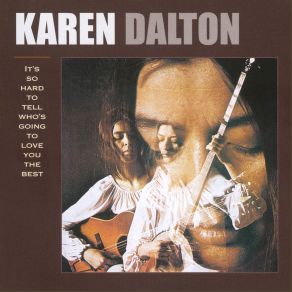It's So Hard to Tell Who's Going to Love You the Best
Download links and information about It's So Hard to Tell Who's Going to Love You the Best by Karen Dalton. This album was released in 1969 and it belongs to Rock, Folk Rock, Songwriter/Lyricist, Psychedelic, Contemporary Folk genres. It contains 10 tracks with total duration of 31:29 minutes.

|
|
|---|---|
| Artist: | Karen Dalton |
| Release date: | 1969 |
| Genre: | Rock, Folk Rock, Songwriter/Lyricist, Psychedelic, Contemporary Folk |
| Tracks: | 10 |
| Duration: | 31:29 |
| Buy it NOW at: | |
| Buy on iTunes $7.99 | |
| Buy on Amazon $7.99 | |
| Buy on Songswave €0.88 | |
| Buy on Songswave €0.88 | |
Tracks
[Edit]| No. | Title | Length |
|---|---|---|
| 1. | Little Bit of Rain | 2:36 |
| 2. | Sweet Substitute | 2:43 |
| 3. | Ribbon Bow | 3:01 |
| 4. | I Love You More Than Words Can Say | 3:34 |
| 5. | In the Evening (It's So Hard to Tell Who's Going to Love You the Best) | 4:33 |
| 6. | Blues On the Ceiling | 3:37 |
| 7. | It Hurts Me Too | 3:07 |
| 8. | How Did the Feeling Feel to You | 2:57 |
| 9. | Right, Wrong or Ready | 2:59 |
| 10. | Down On the Street (Don't You Follow Me Down) | 2:22 |
Details
[Edit]Some find Karen Dalton's voice difficult to listen to, and despite the Billie Holiday comparisons, it is rougher going than Lady Day. But Dalton's vocals aren't that hard to take, and they are expressive; like Buffy Sainte-Marie, it just does take some getting used to because of their unconventional timbre. Her debut album has a muted folk-rock feel reminiscent of Fred Neil's arrangements in the mid-'60s, unsurprising since Neil's Capitol-era producer, Nick Venet, produced this disc too, and since Dalton, a friend of Neil, covered a couple of Neil songs here ("Little Bit of Rain," "Blues on the Ceiling"). Although clocking in at a mere ten songs, it covers a lot of ground, from Tim Hardin, Jelly Roll Morton, and Leadbelly to the traditional folk song "Ribbon Bow" and the Eddie Floyd/Booker T. Jones-penned soul tune "I Love You More Than Words Can Say." The record is interesting and well done, but would have been far more significant if it had come out five years or so earlier. By 1969 such singers were expected to write much of their own material (Dalton wrote none), and to embrace rock instrumentation less tentatively.